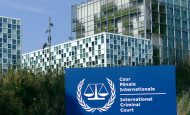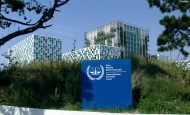NGO Webinar Pushes ICC Lawfare Agenda
On April 13, 2020, the Foundation for Middle East Peace (FMEP) hosted a webinar on “Israel-Palestine at the ICC,” featuring speakers from Human Rights Watch (HRW), Al-Haq, the Center for Constitutional Rights (CCR), and B’Tselem. The webinar advanced the NGOs’ long-standing campaign to pressure the International Criminal Court (ICC) to open an investigation of Israelis over alleged war crimes. The NGOs claimed that the ICC has jurisdiction over the West Bank and Gaza, and that the opening of an investigation would signify the independence of the court.
If, according to these NGOs, an investigation were not opened, the court would be responding to political pressure from governments, such as the US and Israel. Ironically, one NGO official highlighted how NGO lobbying and pressure on the Prosecutor’s office has been central to efforts targeting Israel at the ICC. Confirming the strategy of exploiting international legal mechanisms to advance anti-Israel lawfare, a number of the organizations also referred to the ICC as a tool to be used to apply international pressure on Israel, weakening the true role of the court to punish mass atrocity crimes.
The following summarizes the main NGO arguments:
Al-Haq
The Palestinian NGO Al-Haq’s representative, Michael Kearney, noted the political goals behind the pressure to investigate alleged Israeli crimes at the ICC. He explained that the “ICC is limited logistically in how many people it can investigate and prosecute…so by opening an investigation into the situation in Palestine is to push the international community, Israel, Palestine, and third states to resolve the occupation and bring the occupation to an end” (emphasis added). Keanrey further emphasized the notion of using the ICC as a tool to pressure Israel, claiming that “the Court can recognize the criminality in the situation and can push other countries to live up to their ethical and moral obligations…all states have an obligation to stop violations of international law” (emphasis added).
Center for Constitutional Rights (CCR)
CCR Senior Staff Attorney Katherine Gallagher spoke primarily about the role of “victims” of “the crime against humanity of persecution” and highlighted her personal role in representing Palestinians, referring to them with the possessive “my victims.”
Gallagher discussed the 20 individuals she represents, such as an individual claiming to be denied an exit permit from Gaza to study — supposedly a denial of the right to education. Another was a Palestinian who lives overseas and was “denied entry to Palestine to visit his homeland” and “can’t practice his religion in Jerusalem at Al-Aqsa so this is denial of the right to freedom of religion.” Neither of these alleged denials of rights fall within the jurisdiction of the ICC.
In addition to CCR, Gallagher noted that Palestinians have been represented by other NGOs, explaining that Palestinians “victims have been exercising their right to try and get an investigation opened, primarily through NGOs like Al-Haq, HRW, DCI-P, and Addameer.” (The last of these, Addameer, is a Popular Front for the Liberation of Palestine (PFLP) terrorist organization “affiliate.” In addition, numerous individuals with alleged ties to the PFLP terrorist organization have been employed and appointed as board members at DCI-P. Additionally, in May 2018, Visa, Mastercard, and American Express shut down online credit card donations to Al-Haq due to the group’s ties to the PFLP.)
Human Rights Watch (HRW)
On the call, HRW Associate Director of the International Justice Program Liz Evenson claimed that HRW has “no role in this case” and that the organization has “no role per se.” Evenson even claimed HRW’s “role is to make sure the court has the space it needs to operate independently – can come to conclusions within bounds of law and not have to take these positions in the shadow of extremely political pressure.”
In sharp contrast to her claims, the evidence clearly shows that HRW has been extremely active in lobbying for the ICC to open an investigation against Israel at the ICC, as noted by the CCR official. Its staff, including Executive Director Ken Roth, have met with the ICC Prosecutor.
B’Tselem
In his remarks, B’Tselem Executive Director Hagai El-Ad repeated the political emphasis in the potential ICC investigation, claiming that even though it is unclear if the ICC will open an investigation, “with blanket impunity…even a whiff of accountability is enough to get attention.” El-Ad also referred to international pressure to “free a people” that could stem from an ICC investigation.


